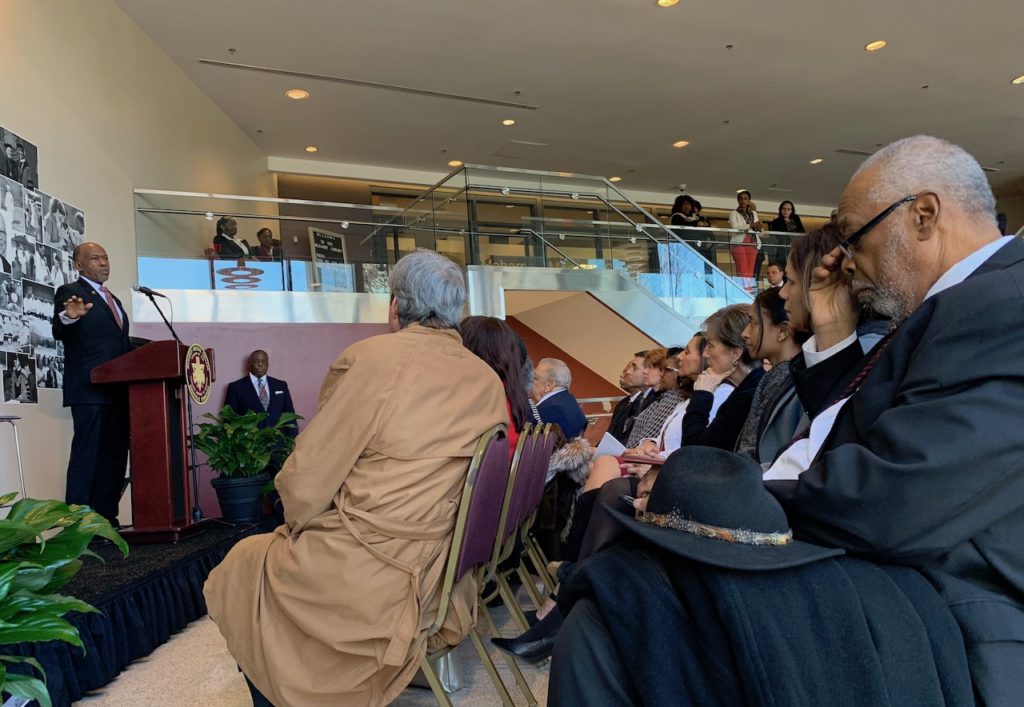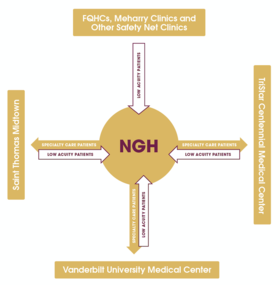
Meharry Medical College has unveiled its big idea to overhaul the way Nashville cares for patients who can’t pay. It would require every hospital in town to cooperate in a new way, funneling the least sick patients to General Hospital, which would refer out those needing specialty care.
Indigent care became an urgent matter in late 2017 when Mayor Megan Barry
proposed closing Nashville General, Meharry’s teaching hospital.
The school started a working group with representatives from the city, General Hospital and HCA TriStar. They spent more than a year looking at how places like Boston, San Francisco and Tampa fund and provide care for the uninsured.
They came up with a business model in which TriStar, Vanderbilt University Medical Center and Ascension Saint Thomas pool the money they currently spend on indigent care — esimated to be more than $150 million — and pay to have low-risk patients transferred to Nashville General Hospital.
“Everybody would agree with me, I think, that Meharry Medical College and NGH have earned the right to be the hub of this system,” Meharry president James Hildreth says.
Dr. James Hildreth says only
@MeharryMedical has the standing to convene all the health care leaders in town to create an indigent care system in Nashville.
pic.twitter.com/kIzuv42gRd— Blake Farmer (@flakebarmer)
March 5, 2019
Hildreth says the transfers would free up other hospitals to provide specialty care, which is often more profitable. General Hospital would see a steady flow of patients and a dependable revenue stream. And the sickest uninsured patients would be referred out for specialty care.

“Transferring low-acuity patients to NGH to keep its census high, freeing up those beds so they can do more of what they do well and make a profit at, that’s the whole idea here,” Hildreth says.
Meharry would also play a data management role in the plan, creating an electronic health record system called BetterHealth Nashville that would even keep track of a patient’s living situation and transportation needs. Those deemed “indigent” would enroll wherever they show up for care and would be tracked as they transfer between institutions.
But the plan first requires buy-in from the hospitals, and that includes General. While it’s on Meharry’s campus, it’s owned by the city.
The hospital put its chief of nursing and a member of the Hospital Authority on the working group, but it has not endorsed the plan, which could be controversial. The proposal would likely result in cutting some existing services to primarily focus on oral health, diabetes and hypertension.
“At this time, the Hospital Authority Board is awaiting the opportunity to have a formal review of the Stakeholder proposal,” chairman Joel Sullivan said in a
statement. The 80-page document (
download here) was made public Tuesday.
The other hospitals offered statements of interest, asking for more discussion. Vanderbilt — which provides, by far, the most charity care in the city and region — called the Meharry proposal “creative,” adding that it “could result in a way forward to address the needs of Nashville’s uninsured.”
Ascension Saint Thomas pointed out that its hospitals are already providing $11 million a month in charity care.
“While we would need more details around the plan, we are open to solutions that enhance access and share this responsibility with our other health system partners,” CEO Tim Adams said in a statement.
HCA TriStar made a point to encourage broad participation, saying it’s “important for all hospital systems in Nashville to be involved in discussions about any indigent care funding model which may ultimately be put in place.”
Meharry’s working group recommends naming an independent team by May to oversee implementation and to create an operating board that represents all of the health systems involved.
If the plan gets that far, one of its early jobs will be to recommend a funding mechanism. Some cities studied by the group have levied special taxes, but Meharry officials say that should be avoidable in Nashville.


